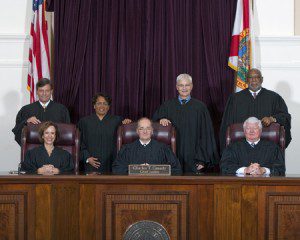The Florida Supreme Court hears oral arguments Wednesday morning in what could be a landmark redistricting case, after a series of shifting coalitions triggered a week and half of topsy-turvy decisions.

Justices are preparing to hear a redistricting case for the first time since voters adopted the anti-gerrymandering Fair Districts amendments in November 2010. So far, the court has seemed divided on when and whether to accept motions beyond an initial filing deadline — and how deep the justices have to pore over the result of the once-a-decade process.
Even legislators say they’re not sure how the court will rule, given the fluid majorities that have decided most of the orders handed down by the justices.
“I think it signifies that, hey, they … are wrestling with new language — never been tested, never been litigated,” said House Speaker Dean Cannon, R-Winter Park.
The latest sign of the scrambled majorities came on an attempt by Democrats to file a revised affidavit Tuesday for a redistricting expert, a move justices rejected on a 4-3 vote. The affidavit would have painted a far less flattering portrait of the Legislature’s plans, with the expert seeming to deflate claims that large numbers of incumbents would square off against each other under the House plan.
According to the expert, Harvard professor Stephen Ansolabehere, 110 of the incumbents currently serving in the House could run for re-election without facing another sitting lawmaker.
“Of these legislators 33 are Democrats and 77 are Republicans,” Ansolabehere said in the affidavit. “This division clearly treats Democrats and Republicans differently.”
Lawyers for Attorney General Pam Bondi and the House and Senate assailed the new affidavit and, by extension, said the numerous corrections in it proved the initial one filed for Ansolabehere was flawed.
The House pointed out in a brief calling for the court to reject the filing that press reports said 38 members would face another incumbent and that the affidavit appears to ignore the fact that term limits will force several lawmakers from office.
“Even if the factual assertions were accurate, fundamental fairness dictates against the submission of new, untested factual data before this Court less than twenty-four hours before oral argument,” the House said.
Democrats said they weren’t fazed by the ruling.
“We attempted to provide the court with the most up to date information, but bottom line nothing has changed: the maps passed by the GOP controlled Legislature represent the partisan gerrymandering and incumbent protection that 63-percent of Floridians overwhelmingly rejected when they passed the Fair District Amendments,” said David Bergstein, a spokesman for the Florida Democratic Party.
Overall, the rulings do appear to provide something of the lay of the land on the court. Chief Justice Charles Canady and Justice Rick Polston have stuck together and seem to favor the Legislature’s argument that the review should be narrow.
Justices Barbara Pariente, Peggy Quince and Jorge Labarga have ruled largely in favor of those challenging the maps.
The swing votes have often proven to be Justices Fred Lewis and James Perry, who could essentially decide whether the court accepts the maps, rejects them out of hand or allows another court to take a look first.
By Brandon Larrabee


